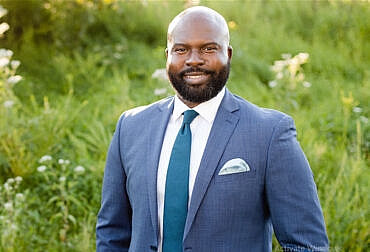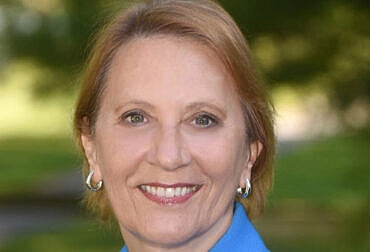Eric Bond: What is your current thinking about how we address climate change?
Marc Elrich: So the County is continuing to review the consultant’s report to develop a blueprint for going forward that is based on the recommendations we got from the climate change citizens committees we created, and we’ll be coming back to those citizens committees with that blueprint. In the meantime, we continue to do some experimenting with things. For example, we have a senior center where we’re looking at the feasibility of using solar windows to generate electricity—this would be our first experiment with solar glass. And if it works, if it generates enough electricity, then we would look at it as a model for replacing all our [County building] windows. And if we can demonstrate that it’s feasible in terms of electric production and cost, we could put it in the building code. I mean, one of the things we said we would do is that as new technologies become feasible, practical, and more affordable, we could start requiring them inside the codes. I’m not going require people to do something that costs 20 times as much as the status quo, so it’s got to be something within reach. That said, there’s a lot of feasible stuff coming on line. Solar windows will come sooner or later.
We are also looking at taking one of our office buildings and wrapping it in solar glass and creating a glass wall outside of the building structure, a curtain wall, that creates both a dead zone for air, which is extra insulation that helps heating and cooling the building, and that generates electricity. Demonstrating that this could work would address one of the biggest conundrums that we have in terms of addressing climate change, which is how to generate electricity on tall office and residential buildings. Currently, office buildings do not have enough roof area for panels. So even if I said, ‘All office buildings have to cover their entire roof with solar panels,’ it would not produce enough solar energy to take care of the electrical needs of the building. But if it is feasible to put these curtain walls of solar glass on the outside of a building, then the game changes. And if you think about commercial buildings– on Saturday and Sunday, electrical draws are often much lower, so there could be two days a week where those buildings are just pumping electricity into the system. In the residential realm, with the falling price of solar panels and battery storage, it’s increasingly possible to make homes energy self-sufficient. This is not rocket science anymore. You could use solar heaters for hot water and solar panels for electricity, and you could take most houses off the grid at best, or greatly decrease their reliance on the grid at the least.
Tax credits for renewables at the federal and state level could help us do some of the things we want to do. We were approached by a company that offered to replace the school bus fleet every 10 years or whatever the normal cycle is with electric buses, and install the battery chargers which would be solar, which we would have paid for anyway. And people wonder, ‘how can [a company] do that?’ The answer is because they’re counting on two things. One is the price of the batteries is coming down. That’s for sure. But the other thing is that, depreciation of capital assets can be a wonderful thing. If you’re an investor you could buy these buses, and use tax credits for depreciation to reduce the cost of the bus fleet along with solar credits attached to the buses, other electric vehicles, batteries, solar panels and charging systems. While government can’t use these tax credits, investors could. So the private sector could buy the buses, and bundle and sell the tax credits to other people and investors. The tax credits become a form of payment which can reduce the dollars the county would normally spend. We’re actually looking for companies to do this with us, both for the school bus fleet, the RideOn bus fleet, for the bus rapid transit buses, and for all our police cars. We plan to just flip our fleet over to electric. We can see a path to doing that that wasn’t as clear two years ago when we were approaching infrastructure as a capital outlay we would have to make. And, in the meantime, we are talking with local power companies that have land around their facilities and are asking what it would it take to solarize their land and bring that into play, which is not in play right now.
BetterMoCo note:
Since this interview, Montgomery County Public Schools entered into a leasing deal to begin replacing their diesel bus fleet with an electric fleet.
Eric Bond: Would you consider doing that in the Ag Reserve?
Marc Elrich:As I said, we’re talking with the power companies that have land in the Ag Reserve. There is an opportunity to install solar up there, as they move out of coal, and that I find really exciting.
We’re also exploring turning our waste into something we can monetize. Right now we take our plastic, bundle it all up and sell it per pound. We’re looking for somebody who we may be able to partner with and who would take our plastic and turn it into a product that has a higher value than bundled plastic.
We’re looking to move to food recycling, and this is a case where we can get a marketable product out of our food waste. It would wind up being composted and being added to our current mulching process, which would increase the value of the mulch and result in our getting higher prices for it. It removes a large part of the waste stream from the incinerator as we move to shutting it down.
Eric Bond: Montgomery County has been a solid democratic County for years, and I would say liberal across the spectrum, various parts of the County being at different points on that spectrum. Do you see Montgomery County becoming truly a progressive County when you start talking about some of these ideas? I think, you know, these are ideas that you often see in smaller jurisdictions, right? The County is a big place, we have country clubs and we have millionaires.
Marc Elrich: Yes, we do. My answer is related to why I want to lease, as opposed to buy, our electric vehicle fleet. I mean, if, if I buy electric school buses or anything electric, I can’t use any of the tax credits. If I am buying directly, I have to pay the full cost of the thing, and I got no tax credits or depreciation, because the government can’t depreciate something and get credit for it. So we’re looking at how we sell things that we can monetize to help us pay for other things. And that makes being progressive an easier thing to do. Easier than if I had to do everything with no other solution but to say that ‘I’m going to have to raise your taxes, and that’s just the price of being civilized.’ You know, I’m sure there will be resistance to doing some of these things [to address climate change]. But if we can come up with ways of taking advantage of the tax system, finding people who are willing to make these investments, then we can achieve a progressive goal using the existing tax structure (which I’ll admit is not what I would like to see in the way of a tax structure, but it is what it is and it’s sitting there and we might as well use it). So I think we can be more progressive in what we can do, but we’ve got to show residents that we’re able to do it in a responsible way. Taxes can’t be the answer to everything. They’re the answer to some things, but they’re not the answer to everything.
On Taxes and Paying for Infrastructure
Eric Bond: So this reminds me a little bit of the challenge of finding the funds for Bus Rapid Transit, coming up with a solution that is economic and feasible, has a positive economic impact, and that also results in benefits environmentally.
Marc Elrich: We are looking closely at Virginia’s tax structures. To be blunt, the development world is under taxed compared to Virginia. One analysis of income taxes or taxes on individuals across the region puts Montgomery County in the middle of the pack, we’re not the highest and not necessarily the lowest. But when you look at real estate taxes, we are pretty much the cheapest state of anybody around because we don’t have a separate commercial and residential tax rate [The Montgomery County rate is a little less than $1.00 per $100 of assessed value.] D.C. has a $0.85 tax on residential real estate, but it goes up to $1.85 on commercial real estate. If you are developing real estate in Tyson’s Corner, it’s $1.65. The base tax rate in Virginia is $1.15 in Fairfax, on top of which they have a 12 or 12.5 cent transportation tax. That is assessed only on commercial property and specifically for building transportation projects.
We don’t have anything like that here. They use special taxing districts to fund infrastructure. I would like our County to switch from assessing impact taxes to special taxing districts. It wouldn’t cost anybody any more, but it would be fairer and it would be much less painful than the system we have today. It would mean we’d have a steady stream of money that we could use to fund bonds that would pay for the infrastructure we need, and it wouldn’t require us to do anything extraordinary. This is how Virginia has been able to build things. Businesses need infrastructure and transportation infrastructure has been critical to Virginia’s success. The development community there supported a myriad of taxes, went to a Republican General Assembly and Governor and got them to give the counties the necessary authority, which gave the county’s the ability to build transportation–think Silver Line–and that sent a message to the business community that they were serious about infrastructure. We don’t have that ability and it’s why we can’t do anything.
Our tax system is broken in this County. This is the reason for the whole fight about Question A versus B. We were trying to understand why people are complaining about their property taxes going up 10%, that didn’t seem possible, because we didn’t raise taxes rates. By the current law, revenues can’t go up more than last year’s revenue plus inflation, and last year’s inflation was, like, next to zero. So how are people getting these 10% increases? We realized the restrictions are on the total money [the County takes in for real estate tax], so if you pay more, someone else pays less. We started looking around and we were running random addresses, and we found houses in Silver Spring where the property value assessment went from $500 thousand to $550 thousand, and somebody got a 10% tax increase. Meanwhile, somebody in Potomac with a $2 million house that has an assessment that is level for three years [the State makes assessments every three years] got a tax cut. That’s because everybody who had to pay more due to a higher assessment pushed us over the total amount of money we could raise [last year plus inflation], so in order to stay below that we had to lower the rates so that the total money we took in stayed under the cap. Pretty much every other jurisdiction gets to benefit from the growth in the tax base, but not Montgomery County. We even misinterpreted the law so that we weren’t even receiving the full tax value of new construction, which was supposed to be exempt from the tax cap. The benefit of new construction was supposed to be that it grew the tax base, but for 20 years or more, the County figured out a way to prevent the tax base from growing and the result is an inability to fund schools and transportation.
So, the current provision allows you to be protected from getting killed in taxes unless your property had an increased assessment, but meanwhile the County wasn’t able to raise money for its expanding needs. Across the river, Virginia raises money and builds infrastructure. It’s a very real problem for us, and so I’m telling people that, ‘you know, if you are not interested in economic development, leave things the way they are, because we won’t be able to build anything anyway.’ Businesses are not going to be interested in coming here, they’ll be looking at Virginia and saying ‘Virginia is moving forward, while Montgomery County is just a sleepy little bedroom place.’ I don’t think that’s good for the County. I think we’ve got too many assets not to use them. It would be crazy not to take advantage of the assets we have here, so we’ve got to figure a way out of this mess. But there’s no way to recapture what we lost, and now the hill we have to climb to be more competitive is steeper than it otherwise would have been. [BetterMoCo note: When voters passed Question A last November, it resolved some of the problems with raising tax revenues.]











